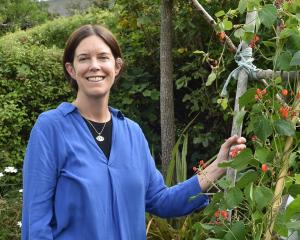ONLY ONE QUESTION - Tom Weston
Tom Weston is a poet and lawyer in New Zealand and a judge in the Cook Islands.
Weston has said of poetry:''Poetry's about the intensity of language. As a litigator, what I deal in is the stuff of language. Statutes, contracts: it's all about language and what it means.''
Weston writes with care and precision rather than rushes of furious passion. He has written quite a few books of poetry. Weston knows how to zoom in on locations and people. He shares his guarded optimism in these new poems. Weston is focused and uncompromising.
''When winter speaks'':
Let nothing matter at this end of town as diggers breakthe road-bed, its loosened skin stacked like ice isstacked in winter.
Let diggers snuffle diesel fumes from battered stacks,spotlights bleakly lit, wide-eyed for this.
Let nothing matter but hardhats heaped on human heads,the buttoned-down gravels turned over, river spawnseeking a way back to sea, exhumed for this indifferent generation.
Let the horned digger come to its own, advance onthe bones of the road, set its bucket to tear at bone.
FEEDING THE BIRDS - Kevin Ireland
Feeding the Birds is Kevin Ireland's 21st book of poems. It is more than 50 years since his debut collection Face to Face (Pegasus, 1963). He has also published short stories, six novels and two books of memoirs. He has won numerous awards. That first collection contained the poem
''Lovebird''. It concludes:
Return to my hand,be locked there tightly,fly here quickly,I walk aimlessly, it grows dark.
Birds flutter in this new collection of poems.
''Ode on a greenfinch'', ''Sungsell bloydds'' and the title poem are all tight, taut and cohesive. Ireland knows how to be shrewd, insightful, honest and blunt. In times gone by Ireland has penned poems like ''A way of sorrow'' for James K Baxter and the emotive ''A model life'' for Dan Davin. This new collection has a tribute ''The older poets'' for Peter Bland:
Out there in the shadows, bunched behind our backs
the older poets are evermore at it, jotting notes to feather
perfect adjustments to the flight-lines of their words.
The odds have always been against success, but most
of those who became survivors (even when the day's
almost necessary bluster upset their aim or swept them
right off target) actually got better at it. Persistence
is too easily mistaken for a passing miracle.
HUNTING ELEPHANTS Peter Bland
Peter Bland is about the same age as Kevin Ireland. He turned 80 not long ago. Bland has had 13 volumes of poetry published in New Zealand. He is a poet, actor, playwright and critic. His lifetime has been divided between England and New Zealand. When Bland was 20 he became a good friend of Louis Johnson, Alistair Campbell and Vincent O'Sullivan. Bland's English childhood keeps calling him back. Both Bland's parents died before he was 16. He had a brother killed during the war, survived prostate cancer and his wife died in 2009. Bland's poems have an edge. Titles in this new collection include: ''Ungrateful Lazarus'', ''Marilyn'' and ''Discovering Jim Baxter''.
''Clown talk'':
They say there's a place
where clowns go to die
and clown-souls gather
at the edge of time. It's
different from where
dying elephants go
to lay down their mountains
of huge bones, but it's
probably close by. There
you'll find old banana skinsdiscarded red noses, rabbits
pulled from hats,and giant shoes as big
as boats, that clown-souls use to reach
the other side.
Hunting Elephants is mature, elegant and powerful.
THERE'S A MEDICAL NAME FOR THIS Kerrin P Sharpe
There's a Medical Name for This is Kerrin P Sharpe's second collection of poems.
''Mining the Heart'' appeared in Essential New Zealand Poems (Godwit, 2014):
. . . the beetle mallet
its repetition a lantern
of pulley and flywheelj
oins the fury of bloodas carts of forgotten sunlight
fall on your wrist
the cardiologist
removes his davy lamp
and closes the valve
''The heart visits Antarctica'' in this new collection. She has appeared in many journals and teaches creative writing. She is distilled, spare and arresting. Sharpe gives soothing dreamlike poems before moving on to darker poems like ''the dictator'':
the brother of birds
smokes feathers
sucks a collar
of small black tunes
coaxes thick slices
of red berries
into his bunker
preorders gasoline
shoots his dog
crushes tiny skulls
of poison for his wife
persuades the gun to talk.
There's a Medical Name for this
contains fire-in-the-belly poems with a mark of uncompromising commitment.
SLEEPING ON HORSEBACK Frances Samuel
Frances Samuel first published her poems in Sport in 2002. It has taken a while for her first collection to appear. Sleeping on Horseback does have a rich feel. A zookeeper frees all his animals. We look for our double so that we can join the ark before it sails. Samuel works as a museum exhibitions writer too. She said: ''When I'm writing the poems, there doesn't feel to me to be a boundary between the `real' world and imaginary.''
''Passing through'':
Morning: he thought he did not deserve it.
Put his mouth to a stream of water,
called in a high voice through long grass
-it would continue this way for the rest of his life.
If, by some miracle, he got to the city, he would have fallen
behind a row of houses, set back from the road,
and been rescued by a suburban girl, looking to raise hell,
finding splinters in the soles of his feet.
He would hand her a night of sleep intact,before setting off at an even pace.
Like the title of this book, you can feel the energy and the emotional restraint. I like Samuel's space and style. Samuel writes poetry that leaves you feeling giddy and weightless.
Hamesh Wyatt lives in Bluff. He reads and writes poetry.











